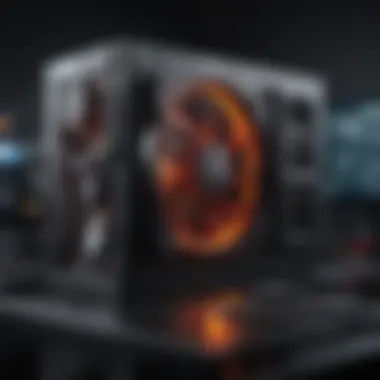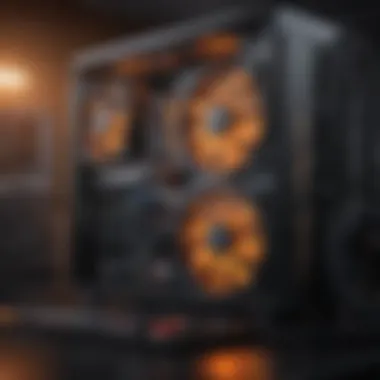Unlocking the Secrets of the Ultimate Gaming PC Kit


Overview
The quest for the ultimate gaming experience leads us into the intricate realm of gaming PC kits, where cutting-edge technology blends with meticulous craftsmanship to create a fusion of power and precision. Delving into the core components that form the backbone of an exceptional gaming setup, this exploration aims to unravel the mysteries behind what makes a gaming PC truly outstanding.
Features & Specifications
Embarking on this journey necessitates a detailed breakdown of the key features and technical specifications that define the ultimate gaming PC kit. From the heart-pounding speed of top-notch graphics cards to the whisper-quiet efficiency of advanced cooling systems, each component plays a pivotal role in shaping the immersive gaming environment that enthusiasts crave.
Pros and Cons
In the pursuit of perfection, it is essential to weigh the advantages and disadvantages of each component in the gaming PC kit landscape. While exceptional performance may be a forte, compatibility issues could rear their heads as potential drawbacks. By assessing the pros and cons with a discerning eye, buyers can make informed decisions tailored to their specific gaming needs.
User Experience
Navigating the vast expanse of gaming PC kits demands a glimpse into the real-world user experiences that breathe life into these technological marvels. From enthusiastic endorsements to critical feedback, user impressions illuminate the highs and lows of each component, providing valuable insights for prospective buyers seeking firsthand accounts of performance and reliability.
Buying Guide
For those venturing into the realm of gaming PC kits, a comprehensive buying guide serves as a beacon of guidance amid the sea of choices. Recommendations rooted in performance benchmarks, value propositions, and targeted audience analysis strive to assist buyers in making informed decisions that align with their gaming aspirations. By arming consumers with a wealth of knowledge, this buying guide aims to simplify the complexities of choosing the ideal gaming PC kit for enhanced gameplay experiences.
Introduction
When delving into the realm of gaming, one cannot overlook the importance of having the ultimate gaming PC kit. This article aims to provide a comprehensive guide to understanding what constitutes the ideal gaming setup. From top-tier graphics cards to advanced cooling systems, readers will embark on a journey to uncover the essence of creating an unparalleled gaming experience.
Understanding Gaming PC Kits
Defining Gaming PC Kits
In the world of gaming, the concept of gaming PC kits revolves around the integration of high-performance hardware components tailored for gaming enthusiasts. These kits encompass a meticulously selected compilation of components that synergize to deliver an immersive gaming experience. The distinctive feature of gaming PC kits lies in their bespoke configuration optimized for rendering top-notch graphics and ensuring seamless gameplay. The advantage of opting for gaming PC kits rests in the assurance of quality components tailored specifically to meet the demands of modern gaming, ensuring a superior gaming performance.
Significance of Custom-Built PCs
Custom-built PCs hold immense significance in the realm of gaming due to their personalized nature. By crafting a PC according to individual preferences and requirements, gamers can enjoy the liberty of choosing components that align with their specific gaming needs. The key characteristic of custom-built PCs lies in their flexibility and scalability, allowing for future upgrades and enhancements to keep pace with evolving gaming technologies. While custom-built PCs offer unparalleled customization options, they may require a higher initial investment compared to pre-built systems. Nevertheless, the ability to tailor every aspect of the PC to one's gaming style and preferences makes custom-built PCs a popular choice among avid gamers.
Benefits of Building Your Own Gaming PC
Customization Options
One of the primary benefits of building your own gaming PC is the level of customization it affords. Gamers can handpick each component, from the processor to the case design, to create a system that perfectly aligns with their gaming preferences. This customization extends beyond aesthetics, allowing users to select performance-oriented parts that cater to their specific gaming requirements. The ability to tailor the PC to one's unique preferences ensures a personalized gaming experience that stands out from standard off-the-shelf systems.
Performance Optimization
Building your gaming PC enables gamers to optimize performance according to their gaming needs. With the freedom to select components based on individual performance requirements, users can fine-tune their system for maximum gaming prowess. Performance optimization extends to factors such as overclocking components, adjusting cooling solutions, and ensuring compatibility between all parts for seamless operation. By focusing on enhancing performance, gamers can create a system that delivers unparalleled speed, responsiveness, and graphical fidelity - elevating the gaming experience to new heights.
Overview of Components
Central Processing Unit (CPU)
The Central Processing Unit (CPU) serves as the brain of the gaming PC, responsible for executing instructions and running applications. When selecting a CPU for a gaming rig, factors such as clock speed, core count, and cache memory play a crucial role in determining performance. Gamers often lean towards CPUs known for their high processing power and efficiency to ensure smooth gameplay and multitasking capabilities.
Graphics Processing Unit (GPU)
The Graphics Processing Unit (GPU) holds paramount importance in gaming PCs, handling the rendering of graphics and visual effects. Gamers face the decision between NVIDIA and AMD GPUs, each offering unique features such as ray tracing capabilities and optimized performance for specific gaming titles. The choice of GPU significantly influences a gaming PC's ability to deliver stunning visuals and maintain high frame rates during gameplay.
Motherboard
The motherboard acts as the foundation of the gaming PC, connecting all components and facilitating communication between them. Factors such as form factor and socket type determine the compatibility of the motherboard with other parts. Gamers must select a motherboard that accommodates their chosen CPU and GPU, provides ample connectivity options, and supports future upgrades to enhance the system's longevity.
Memory (RAM)


Memory capacity and speed are crucial considerations when choosing RAM for a gaming PC. DDR4 and DDR5 RAM modules offer varying performance levels, with DDR5 boasting higher data transfer rates for improved gaming responsiveness. Adequate RAM capacity ensures smooth multitasking and prevents bottlenecks during intense gaming sessions, contributing to a seamless gaming experience.
Storage (SSDHDD)
Storage options for gaming PCs encompass Solid State Drives (SSD) and Hard Disk Drives (HDD), each offering unique benefits. SSDs deliver faster loading times and quicker data access, enhancing overall system responsiveness. HDDs provide higher storage capacities at a more affordable price point, making them ideal for storing large game libraries and multimedia content. Gamers can opt for a combination of SSD and HDD storage to balance speed and capacity according to their requirements.
Power Supply Unit (PSU)
The Power Supply Unit (PSU) is responsible for supplying stable power to all components within the gaming PC. Selecting a PSU with adequate wattage based on the system's power requirements is essential for ensuring stability and preventing power-related issues. Efficiency ratings such as 80 PLUS certifications indicate the PSU's energy efficiency, contributing to lower operating costs and reduced heat generation within the system.
Cooling Solutions
Efficient cooling solutions are vital for maintaining optimal performance and prolonging the lifespan of gaming PC components. Gamers can choose between air cooling and liquid cooling systems, each offering distinct advantages. Air coolers provide cost-effective and reliable cooling solutions, while liquid cooling systems excel in dissipating heat efficiently, especially during intense gaming sessions. In addition to selecting the right cooling solution, configuring fans and monitoring temperatures are crucial for preventing overheating and ensuring system stability.
Peripherals
Peripheral devices such as keyboards, mice, monitors, and headsets play a pivotal role in enhancing the overall gaming experience. Gamers should prioritize peripherals that offer comfort, responsiveness, and customization options to augment gameplay immersion. High-quality keyboards with customizable RGB lighting, precision gaming mice with adjustable DPI settings, immersive monitors with high refresh rates, and noise-canceling headsets equipped with surround sound are essential components for creating an immersive gaming environment.
Choosing the Right Components
When delving into the realm of building the ultimate gaming PC kit, one of the most critical stages is choosing the right components. Selecting the proper elements ensures optimal performance and customization tailored to your specific gaming needs. By meticulously analyzing each component, from the CPU to peripherals, you empower yourself to craft a gaming rig that maximizes both efficiency and experience. This section will dissect the significance of selecting the right components and shed light on the various considerations that go into this crucial decision-making process.
CPU Selection
Intel vs. AMD Processors
The debate surrounding Intel vs. AMD processors is a cornerstone of building a gaming PC. Both brands offer distinct advantages depending on your gaming preferences and system requirements. Intel processors typically excel in single-core performance, ideal for tasks that demand high clock speeds. On the other hand, AMD processors shine in multi-core performance, beneficial for multitasking and content creation. By understanding the nuances of Intel and AMD processors, you can optimize your gaming rig for efficiency and speed.
Performance Considerations
When considering performance factors for your gaming PC, aspects like clock speed, core count, and cache memory play a pivotal role. These considerations directly impact your system's capability to handle resource-intensive games and applications. By evaluating these performance metrics, you can fine-tune your gaming PC to deliver seamless gameplay and enhanced user experience.
GPU Considerations
NVIDIA vs. AMD Graphics Cards
The choice between NVIDIA and AMD graphics cards is a crucial decision that influences your gaming PC's visual performance. NVIDIA cards often feature cutting-edge technologies like ray tracing and DLSS, enhancing graphics rendering and overall gaming immersion. Meanwhile, AMD's offerings are known for their competitive pricing and robust performance, providing budget-friendly options without compromising on quality.
Ray Tracing Capabilities
Ray tracing capabilities denote the graphics card's ability to simulate realistic lighting and shadows in games, elevating visual fidelity to new heights. NVIDIA's RTX series, renowned for its ray tracing prowess, delivers unparalleled graphics quality that transforms gaming environments with lifelike precision. By harnessing ray tracing technology, gamers can experience virtual worlds with unprecedented realism and detail.
RAM and Storage Choices
DDR4 vs. DDR5 RAM
The DDR4 vs. DDR5 RAM debate centers on memory speed, bandwidth, and power efficiency. DDR5 RAM offers faster data transfer rates and improved power management compared to DDR4, enhancing system responsiveness and multitasking capabilities. Understanding the distinctions between DDR4 and DDR5 RAM empowers you to optimize memory performance in your gaming PC setup.
SSD vs. HDD Options
The choice between SSD and HDD storage drives influences data access speed and system responsiveness. SSDs excel in rapid data retrieval and boot times, ideal for quick game loading and seamless application performance. Conversely, HDDs offer high storage capacity at a lower cost-per-gigabyte, suitable for mass data storage and archiving. Balancing the benefits of SSDs and HDDs is crucial in achieving an efficient storage solution for your gaming PC.
Motherboard Compatibility
Form Factors
Motherboard form factors determine the physical dimensions and layout of components in your gaming PC. Common form factors like ATX and micro ATX offer varying sizes and expansion capabilities to accommodate different system requirements. Choosing the appropriate form factor ensures seamless compatibility with other components and facilitates easy system assembly and maintenance.
Socket Types
Socket types denote the CPU socket interface on the motherboard, defining compatibility with specific processor models. Intel and AMD CPUs feature distinct socket designs that dictate processor installation and functionality. Selecting the correct socket type ensures a secure and efficient connection between the CPU and motherboard, optimizing system performance and stability.


Power Supply Considerations
Wattage Requirements
Determining the wattage requirements for your gaming PC is crucial to ensure stable power distribution and prevent system overload. Calculating the power consumption of individual components like the CPU and GPU helps you select an appropriate wattage power supply unit. Choosing the right wattage rating promotes system longevity and prevents potential power-related issues during intense gaming sessions.
Efficiency Ratings
Efficiency ratings reflect the power supply unit's effectiveness in converting AC power to DC power for your system. Higher efficiency ratings indicate reduced energy waste and heat generation, essential for maintaining a cool and energy-efficient gaming PC setup. Opting for a power supply unit with superior efficiency ratings optimizes power usage and minimizes utility costs in the long run.
Cooling Solutions
Air Cooling vs. Liquid Cooling
The choice between air cooling and liquid cooling solutions revolves around thermal performance and system temperature regulation. Air cooling, utilizing fans and heat sinks, offers cost-effective cooling for moderate system heat dissipation. In contrast, liquid cooling systems, employing coolant and radiators, provide superior heat transfer capabilities for enhanced thermal management, ideal for overclocked systems and intense gaming scenarios.
Fan Configuration
Optimizing fan configuration in your gaming PC enhances airflow circulation and heat dissipation, maintaining optimal system temperature levels. Strategic placement of intake and exhaust fans facilitates efficient cooling of internal components, preventing heat buildup and system instability. By fine-tuning fan configuration based on case airflow dynamics, you can create a well-ventilated and thermally balanced gaming environment.
Peripheral Devices
Keyboards and Mice
Selecting high-performance keyboards and mice tailored to your gaming style enhances control precision and responsiveness during gameplay. Gaming peripherals with customizable keys, ergonomic designs, and enhanced sensor technologies optimize input accuracy and comfort, empowering you to achieve peak gaming performance.
Monitors and Headsets
Investing in top-tier monitors and headsets enriches your gaming experience by delivering immersive visuals and audio quality. High-refresh-rate monitors with low response times ensure fluid gameplay and reduced motion blur, essential for competitive gaming success. Likewise, premium gaming headsets equipped with surround sound and noise-canceling features bring game audio to life, enabling you to pinpoint auditory cues and fully immerse yourself in virtual worlds.
Building Your Gaming PC
Building your gaming PC is an indispensable and exciting stage in the journey towards a high-performance gaming setup. It encapsulates the culmination of selecting top-tier components and meticulously assembling them to create a custom powerhouse capable of delivering an immersive gaming experience. By building your gaming PC, you not only gain a deeper understanding of hardware functionalities but also empower yourself with the ability to tailor the system to your specific gaming requirements.
Assembly Process
Installation of CPU and GPU
When delving into the installation of the CPU and GPU, precision and care are paramount. Installing these crucial components correctly ensures optimal performance and longevity of your gaming PC. The CPU serves as the brain of the system, executing instructions and calculations, while the GPU handles graphics processing, enhancing visuals and overall gaming performance. Proper installation guarantees efficient heat dissipation and seamless communication between the components.
Mounting the Motherboard
Mounting the motherboard is a pivotal step as it serves as the central hub connecting all the essential hardware components. Securing the motherboard correctly within the case ensures stability and facilitates proper functioning of the CPU, GPU, RAM, and other peripherals. The choice of motherboard impacts compatibility, expansion options, and overall system performance, making it a critical consideration in building a gaming PC.
Inserting RAM and Storage Devices
Inserting RAM modules and storage devices completes the essential hardware setup. RAM dictates multitasking capabilities and overall system speed, while storage devices store crucial data and games. Proper insertion of these components guarantees smooth operation and efficient data access. Understanding the difference between various RAM types and storage options enables you to tailor your gaming PC for optimal performance and storage capacity.
Cable Management
Organizing Power Cables
Effective management of power cables ensures a clean and clutter-free internal layout, promoting airflow and aiding in component cooling. Organizing power cables optimizes power distribution and prevents interference with moving parts such as fans and drives. Proper planning and routing of power cables enhance the overall aesthetics of your gaming PC while facilitating easier maintenance and upgrades.
Managing Data Cables
Managing data cables, including SATA and front panel connectors, is essential for ensuring proper connectivity and data transfer speeds. Securing data cables prevents accidental disconnection and data loss, maintaining system stability and reliability. Proper management of data cables streamlines troubleshooting processes and facilitates future hardware upgrades.
Testing and Troubleshooting


BIOS Configuration
Configuring the BIOS is a critical aspect of optimizing system performance and ensuring hardware compatibility. Accessing and adjusting BIOS settings allows you to fine-tune system parameters, such as fan speeds, RAM frequency, and boot priorities. Proper BIOS configuration maximizes hardware potential and stability, unlocking advanced features and functionalities.
Stress Testing Components
Stress testing components involves subjecting the system to various workloads to assess stability and performance under demanding conditions. Stress tests evaluate CPU, GPU, RAM, and storage device capabilities, identifying potential bottlenecks and stability issues. Conducting thorough stress tests allows you to validate system integrity, diagnose any operational anomalies, and optimize hardware configurations for peak performance.
Optimizing Performance
In the realm of building a top-of-the-line gaming PC, optimizing performance stands as a crucial step towards achieving unparalleled gaming experiences. By focusing on enhancing the performance capabilities of key components within the PC setup, individuals can unlock the full potential of their hardware. Optimal performance ensures smoother gameplay, quicker loading times, and seamless multitasking abilities, all contributing to a superior gaming environment.
Overclocking Potential
CPU and GPU Overclocking
When delving into optimizing performance, a prominent strategy that enthusiasts consider is CPU and GPU overclocking. This technique involves pushing the processors beyond their specified clock speeds to boost overall system performance. The key characteristic of overclocking lies in extracting additional computational power, which is especially beneficial for gaming enthusiasts seeking enhanced frame rates and smoother gameplay experiences.
Overclocking unlocks the unique feature of achieving higher processing speeds, thereby improving gaming performance and responsiveness. However, it is essential to acknowledge the potential drawbacks as overclocking may lead to increased heat generation and instability in some setups. Despite these challenges, for individuals aiming for top-notch gaming experiences, CPU and GPU overclocking present themselves as popular and effective choices for optimizing performance.
Performance Monitoring Tools
Another crucial aspect of optimizing performance is the utilization of performance monitoring tools to track and analyze the system's operation. These tools offer real-time insights into CPU and GPU usage, temperature levels, and overall system performance metrics. By actively monitoring these key parameters, users can identify potential bottlenecks or issues, allowing for timely interventions to maintain peak performance.
The primary characteristic of performance monitoring tools is their ability to provide a comprehensive overview of the system's health and performance, making them indispensable for fine-tuning gaming setups. Their unique feature lies in enabling users to detect anomalies and optimize system configurations for enhanced gaming experiences. While there are advantages to utilizing performance monitoring tools, such as proactive system management, users should be cautious of potential resource consumption and compatibility issues.
Software Tweaks
Operating System Optimization
Within the realm of optimizing performance, operating system optimization plays a critical role in maximizing the efficiency and responsiveness of a gaming PC. By fine-tuning system settings, disabling unnecessary processes, and configuring OS components for gaming, users can squeeze out additional performance gains. The key characteristic of OS optimization lies in streamlining system resources towards gaming-related tasks, resulting in improved overall responsiveness and reduced latency.
Operating system optimization's unique feature is its capability to prioritize gaming performance by minimizing background processes and system overhead. This approach offers advantages such as smoother gameplay, quicker loading times, and increased frame rates for an enhanced gaming experience. Nonetheless, users should be mindful of potential drawbacks, including compatibility issues with certain applications or services that may require specific system configurations.
Driver Updates
In the pursuit of optimizing performance, ensuring that device drivers are up to date stands as a crucial endeavor for maintaining system stability and maximizing hardware compatibility. Driver updates provide improvements in performance, bug fixes, and enhanced features for hardware components, promoting a seamless gaming experience. The key characteristic of driver updates lies in enhancing hardware functionality, resolving compatibility issues, and delivering optimized performance for gaming applications.
Driver updates' unique feature is their ability to ensure that hardware components operate efficiently and reliably, optimizing system performance for gaming environments. While the advantages include improved stability and enhanced functionality, users should exercise caution during driver updates to prevent potential issues such as driver conflicts or system instability.
Maintenance and Upgrades
Regular Cleaning
A fundamental aspect of optimizing performance involves regular cleaning of the system components to prevent dust accumulation and maintain optimal thermal conditions. Regular cleaning extends the lifespan of hardware components, enhances cooling efficiency, and ensures stable system performance. The key characteristic of regular cleaning is preserving system integrity by mitigating heat build-up and preventing hardware degradation.
Regular cleaning's unique feature lies in sustaining a clean and dust-free environment within the PC setup, promoting efficient heat dissipation and overall system reliability. While the benefits encompass improved thermal management and prolonged hardware longevity, users should handle cleaning tasks with care to avoid damaging delicate components or disrupting system functionality.
Component Upgrades
For enthusiasts seeking to elevate their gaming experience, considering component upgrades is a strategic approach to optimizing performance. Upgrading key hardware components such as the CPU, GPU, RAM, or storage drives can significantly boost system capabilities and enable higher gaming performance levels. The key characteristic of component upgrades is enhancing system functionality and future-proofing the gaming setup for upcoming software and hardware demands.
Component upgrades' unique feature is their ability to introduce advanced features, improved performance, and expanded capabilities to the existing gaming PC configuration. While the advantages include enhanced gaming experiences and system responsiveness, users should carefully research and choose compatible components to avoid potential compatibility issues or performance bottlenecks.
Conclusion
In concluding the exploration of the ultimate gaming PC kit, it is imperative to understand the significance of creating a tailored gaming setup. The final moment in this article serves as a crucial reflection on the key components and processes involved in constructing a high-performance gaming rig. By following the intricate steps outlined, readers can elevate their gaming experience to unprecedented levels. The Conclusion section encapsulates the essence of investing time and effort into selecting the right components, assembling them meticulously, and optimizing performance for maximum enjoyment.
Embracing the World of Gaming PCs
Future Trends
Delving into the future trends of gaming PCs opens up a realm of possibilities for enthusiasts. The rapid evolution of technology introduces novel features and capabilities that push the boundaries of gaming experiences. Future trends, such as advancements in ray tracing technology and AI integration, promise enhanced realism and immersion in games. Adopting these trends ensures that a gaming PC remains at the forefront of innovation, delivering cutting-edge performance and visual fidelity. However, the flip side of embracing future trends lies in the necessity for frequent upgrades to keep pace with the ever-changing landscape of technology.
Community Engagement
Community engagement plays a pivotal role in the gaming PC ecosystem, fostering a sense of belonging and camaraderie among players. Connecting with like-minded individuals enables enthusiasts to exchange knowledge, seek advice, and share experiences related to gaming setups. The vibrant community acts as a source of inspiration and support for individuals embarking on their gaming PC journey. One of the key advantages of community engagement is the abundance of resources and guidance available, ranging from troubleshooting tips to hardware recommendations. Yet, it is essential to navigate online communities cautiously, as misinformation and bias can sometimes cloud the advice provided, potentially leading to suboptimal decisions in building and maintaining a gaming PC setup.







